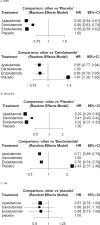Apalutamide, enzalutamide, and darolutamide for non-metastatic castration-resistant prostate cancer: a systematic review and network meta-analysis
- PMID: 32924096
- PMCID: PMC7572325
- DOI: 10.1007/s10147-020-01777-9
Apalutamide, enzalutamide, and darolutamide for non-metastatic castration-resistant prostate cancer: a systematic review and network meta-analysis
Abstract
Management of non-metastatic castration-resistant prostate cancer (nmCRPC) has undergone a paradigm shift with next-generation androgen receptor inhibitors. However, direct comparative data are not available to inform treatment decisions and/or guideline recommendations. Therefore, we performed network meta-analysis to indirectly compare the efficacy and safety of currently available treatments. Multiple databases were searched for articles published before June 2020. Studies that compared overall and/or metastasis-free and/or prostate-specific antigen (PSA) progression-free survival (OS/MFS/PSA-PFS) and/or adverse events (AEs) in nmCRPC patients were considered eligible. Three studies (n = 4117) met our eligibility criteria. Formal network meta-analyses were conducted. For MFS, apalutamide, darolutamide, and enzalutamide were significantly more effective than placebo, and apalutamide emerged as the best option (P score: 0.8809). Apalutamide [hazard ratio (HR): 0.85, 95% credible interval (CrI): 0.77-0.94] and enzalutamide (HR: 0.86, 95% CrI: 0.78-0.95) were both significantly more effective than darolutamide. For PSA-PFS, all three agents were statistically superior to placebo, and apalutamide emerged as the likely preferred option (P score: 1.000). Apalutamide (HR: 0.71, 95% CrI: 0.69-0.74) and enzalutamide (HR: 0.76, 95% CrI: 0.74-0.79) were both significantly more effective than darolutamide. For AEs (including all AEs, grade 3 or grade 4 AEs, grade 5 AEs, and discontinuation rates), darolutamide was the likely best option. Apalutamide and enzalutamide appear to be more efficacious agents for therapy of nmCRPC, while darolutamide appears to have the most favorable tolerability profile. These findings may facilitate individualized treatment strategies and inform future direct comparative trials.
Keywords: Apalutamide; Darolutamide; Enzalutamide; Network meta-analysis; Non-metastatic castration-resistant prostate cancer.
Conflict of interest statement
None of the authors have conflicts of interest to disclose.
Figures



References
Publication types
MeSH terms
Substances
LinkOut - more resources
Full Text Sources
Other Literature Sources
Research Materials
Miscellaneous

